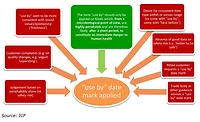Supply Chain
Fighting food fraud with the right tools
Analytical and software tools make it easier to manage suppliers and weed out fraudulent ones

I’ve covered food fraud in the pages of FE a number of times over the years, and one 2016 article entitled, “VACCP: HACCP for vulnerability assessments,” still draws on average 750 page views per month. Needless to say, discerning consumers are aware of some of the typical frauds that present themselves at the store: fake honey, olive oil containing cheaper vegetable oils, fake pomegranate juice, seafood imposters at a restaurant—and who could forget the melamine crisis of a few years ago?
Severin Weiss, CEO of SpecPage and an expert in integrated software process solutions for recipe-based food and beverage processors, thinks PLM (product lifecycle management) and PDM (product data management) are two sets of tools that can help food processors avoid using fraudulent ingredients from less-than-scrupulous suppliers. Of course, there’s no substitute for some lab tests to verify that the ingredient is what the supplier’s COA says it is.
FE: SpecPage provides PLM and PDM software solutions. Could you describe these in a little more detail?
Severin Weiss: The F&B industry is characterized by complex product structures and production processes—particularly for manufacturers of recipe-based products.
This makes a process-oriented concept in product development indispensable. Companies need to maintain and manage comprehensive, coherent and accurate product data in all internal systems and exchange information with trade partners as required.
Product Lifecycle Management (PLM) manages data for all stages and areas of the product lifecycle, integrating them into a single solution and facilitating efficient and transparent information management. This comprehensive and cross-functional solution can streamline and improve company-wide processes that are associated with the development, production and launch of products, allowing producers to drive innovation, minimize costs and risks, and gain a substantial competitive advantage in the market.
FE: So let’s start at the beginning. Adrianna’s 100 percent pure salad dressings, which are found in the refrigerator section at the grocery store, are made only from the purest olive oil, herbs and spices. To live up to her reputation she demands only the finest ingredients, but rather than just accept her suppliers’ COAs, she also has them lab tested for purity and food safety. So already, she has a records problem—or data issue. She needs to correlate her lab results with the respective COAs. Should she be using a FSQM (food safety & quality management) software system or something else—or both? And what would that be?
Looking for quick answers on food safety topics?
Try Ask FSM, our new smart AI search tool.
Ask FSM →
Weiss: What Adrianna really needs is a comprehensive, end-to-end, adaptive process solution. She needs to analyze her products on an attribute level, so in addition to a product lifecycle management and master data management solution, she would need a LIMs system.
LIMs or laboratory information and management systems, automate daily laboratory processes and workflows—they work very well for quality control and regulatory compliance too.
Also, she can and should check with her distributors and suppliers to make sure that they are certified and conduct regular audits.
FE: I know that PLM software can be used to see a product from its beginning (recipe or design) to end of life, of which can be sometimes short due to food fads that come and go. So how can PLM be applied to fighting food fraud?
Weiss: Food fraud shows up in the most—and least—likely places, as usually a result of the lack of visibility in a very complex supply chain with insufficient testing, and infrequent supplier audits and inspections.
With a comprehensive PLM supply chain process solution in place, information can be traced back to its origin, and the PLM processes become the single source of truth regarding all product information.
Not only can manufacturers rely on the information, but auditors very easily can review the process.
Product lifecycle management processes represent complete solutions. They are flexible and collaborative frameworks—so not only do they help fight food fraud, but also, they were specifically designed to accurately integrate and provide cross-functional support and data driven solutions throughout the entire supply chain in conformance with best practices and acceptable standards—managing variations and specifications by product, source, destination, etc.
FE: How does PLM software tie into a recipe management system, which food processors are apt to have already? How does it tie into a LIMS (laboratory information management system)? How about an ERP system?
Weiss: PLM includes a recipe management system, and most manufacturers don’t have integrated recipe management that can track changes, simulations and recipe versions with real-time approval processes in place. The majority of manufacturers—believe it or not—still uses Excel spreadsheets to manage their recipes.
The specifications stored and defined in a PLM are the source for an inspection plan in a LIMs – SpecPage solution. SpecPDM can either interface to an external LIMs or we have an integrated LIMs module available. The integration between ERP and PLM is key. During the development stage, developers need accurate pricing information per ingredient, which comes from the ERP. But, once a new product is developed, the information must be passed on to the ERP to make sure that no mistakes are made, and that the outdated versions [are not active] in an ERP.
FE: SpecPage also provides a PDM (product data management) solution. Is this an underlying structure or platform to support the PLM package, or is it something else?
Weiss: PDM is crucial—it is the key in a food related PLM. Product data management allows the storing, versioning and management of any single attribute or information regarding the supply chain—from raw material to finished products. PDM allows manufacturers to develop better products, more efficiently while ensuring compliance with strict regulatory requirements. PDM supports QM and R&D—it is a single, centralized database that contains all the tools to standardize the internal processes necessary for a complete product lifecycle management solution. PLM is a cross-organizational tool for collecting, controlling and publishing approved product configurations.
FE: SpecPage also provides a global data synchronization (GDSN) solution. Can you describe what it does?
Weiss: GDSN is a global data synchronization network conceived by GS1. As local groceries offer more internationally sourced products, GDSN will improve the efficiency of getting those products into the hands of consumers by enabling shared product data accurately around the globe. Going back to the previous definition of PDM—product data stored in the system must be published to a global network to make it accessible to the retail channel and the consumer.
FE: Sometimes an ingredient can be tampered with between the supplier and the processor. This could happen due to organized crime intercepting shipments and then tampering with the product before it gets to an intermediate distributor/dealer or shipper. Can PLM software help tackle these issues? How?
Weiss: A PLM cannot track the COA’s across the supply channel—it enables the traceability and transparency of product information. But this product information is built into the foundation for audit and inspection plans—stored and managed in a LIMs. The result is transparent certificate of analysis (COA). If the entire supply chain is transparent and consistently monitored and audited, food fraud is less likely and would attract attention quickly. This is the beauty of an end-to-end process system. It is very easily audited and will catch issues along the supply chain.
FE: Since ingredients are coming from around the globe, how can PLM and/or PDM software tools help manage ingredient suppliers and find the illegitimate ones?
Weiss: One of the biggest challenges in the food industry is the multi-sourcing of ingredients. But with a comprehensive PLM in place, all sources for the ingredients can be tracked and monitored and—again, very easily audited. With professional supplier management and regular audits, weak points in the supply chain become instantly visible and can be either repaired or excluded. PLM provides the foundation to enable the transparency and traceability by supporting end-to-end data processes and recording.
FE: As I noted extensively in the VACCP article, FDA’s FSMA doesn’t really have much to say about food fraud—unless it becomes a food safety incident. In the US, food fraud is more likely to be a consumer protection issue with the Federal Trade Commission. Europeans, however, seem to take food fraud much more seriously. How do you work with these differing levels of concern related to food fraud and food safety?
Weiss: The European Commission has launched a new information-sharing system to tackle the issue of food fraud and quality in the European Union.
The Knowledge Centre for Food Fraud and Quality has been set up in response to consumer concerns about food products most susceptible to tampering or adulteration like olive oil, wine, honey, dairy, fish, meat and poultry.
But also in the US there are data bases available, like the Food fraud database https://decernis.com/solutions/food-fraud-database/ from our partner company Decernis.
SpecPage process solutions originated in Europe, so we are the experts. We have been required for more than a decade to build comprehensive functionality in order to support our European customers in regulatory compliance. We now have customers on every continent, so it is second nature to anticipate and resolve issues that arise with regulatory compliance, transparency and great traceability. The requirements are just now making their way through the system for consumers in the US, but we have been subject to strict regulations and welcome the opportunity to serve customers in the U.S. and help them navigate these issues.
FE: What else is important with regard to food fraud that we didn’t discuss?
Weiss: Food and beverage manufacturers must continue to invest in technology, to really lean-in, monitor and audit their supply chains where there is a higher risk.
In the very near future, I think we may get some assistance from Blockchain—that technology will definitely make it more difficult for fraudsters to fake data, especially with recipe-based or processed foods.
Food and beverage companies can learn from other industries, like big pharma, who have been dealing with counterfeiting issues and have found innovative ways to reduce and eliminate fraud with PLM and PDM process solutions.
About Severin J. Weiss, CEO, SpecPage
Severin Weiss is widely recognized as a global expert in integrated software process solutions for recipe-based food and beverage manufacturers. He founded SpecPage in 2006.
SpecPage is a multinational privately held computer software manufacturer, software supplier and IT service provider, specializing in Product Lifecycle Management, (PLM), Product Data Management, (PDM), Global Data Synchronization, (GDSN), Laboratory Management (LIMS), Enterprise Systems Management, (ERP), Environment Health Site Assessment/Materials Safety Data Sheet, (EHSA/MSDS) Regulatory Solutions for Food and Recipe Development, (RSFRD), and Global Regulatory Compliance, (GRC).
The company is headquartered primarily in Switzerland and the US, with offices in Sweden, Germany, France, Italy, Slovakia, the Netherlands, Singapore, China and Taiwan.









